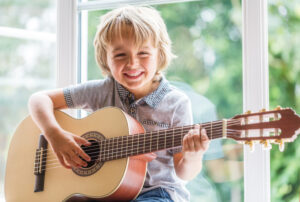As teachers who work with some of the youngest budding musicians, we’re often asked: Can preschoolers really learn to play guitar? The answer is yes—but starting guitar lessons for preschoolers takes a slightly different approach than it does with older children or adults.
While tiny fingers and short attention spans can present challenges, the right environment and expectations can turn those challenges into exciting milestones. If you’re considering starting your preschooler on the guitar, here’s what we recommend based on years of experience teaching private music lessons.
Is Your Preschooler Ready for Guitar?
Every child develops differently, but a few signs can help you determine if your child is ready to begin lessons:
- They show consistent interest in music.
If your child loves strumming toy guitars or mimicking sounds, that’s a good sign. - They can focus for short periods.
Preschool guitar lessons should start at 15–20 minutes and grow from there. - They have some finger coordination.
They should be able to hold objects, press buttons, or move individual fingers somewhat independently.
Choosing the Right Guitar
Size and type matter. Preschoolers need a guitar that fits their hands and body to make learning comfortable and fun.
Recommended options:
- 1/4 or 1/2 size acoustic guitars
- Nylon strings (softer on fingers)
- Lightweight models with a rounded back
Some parents also start with a ukulele or small-scale guitar to build early skills.
How to Structure Lessons for Preschoolers
Here’s how we tailor lessons for younger students:
- Keep it playful.
Use games, storytelling, and songs they know to introduce musical concepts. - Rotate activities often.
Preschoolers need frequent transitions—every 3–5 minutes is ideal. - Use visual aids.
Color-coded frets, stickers, and big charts help kids stay engaged. - Celebrate every win.
Small successes (like pressing a string correctly) are major victories.
To see how beginner progress typically unfolds, you can check out our breakdown of the music lesson timeline.
Supporting Practice at Home
At this age, parent involvement is key. You don’t need to know how to play guitar—you just need to be present. Help with:
- Setting up the instrument
- Keeping a routine
- Praising effort over perfection
Just 5–10 minutes of daily exploration can reinforce lessons in a big way.
FAQ
Can 3- or 4-year-olds really learn guitar?
Yes, if they show interest and lessons are developmentally appropriate. Short, fun sessions work best.
What’s the best age to start formal guitar instruction?
Ages 4–6 is a great time to start. Earlier learners benefit most from personalized, private instruction.
Is it better to start with a ukulele?
For some children, yes. A ukulele’s size and softer strings can serve as a stepping stone to guitar.
Final Thoughts
Starting guitar lessons for preschoolers isn’t about mastering scales right away—it’s about planting seeds. With the right approach, your little one can build coordination, confidence, and a lifelong love of music.
For more on how music lessons benefit early childhood development, check out this research from the National Association for Music Education.
